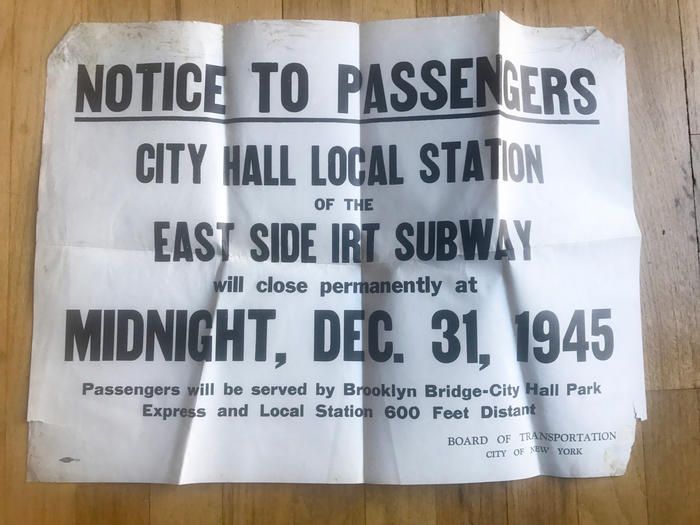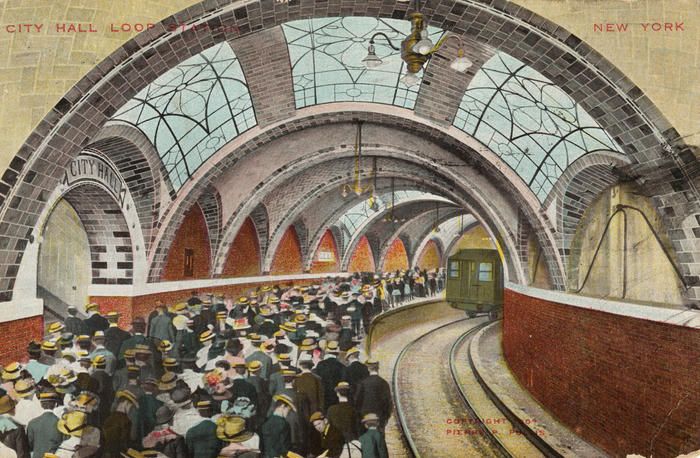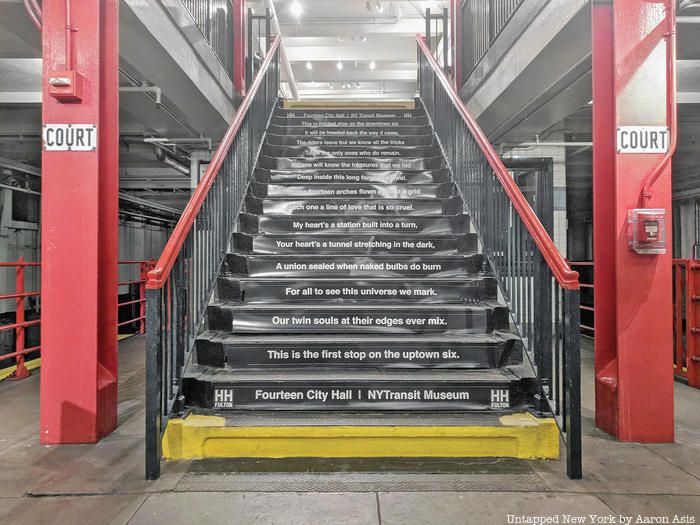After-Hours Tour of the Fraunces Tavern Museum: "Path to Liberty"
Explore a new exhibit inside the oldest building in Manhattan, a witness to history throughout the Revolutionary War Era!


The new year of 1946 opened with the closure of one of New York City’s grandest subway stations. At midnight on December 31st, 1945, City Hall Station, the first subway station to open in New York City, was permanently shuttered. This week marks seventy-five years since the station shutdown. Since City Hall Station closed, it has become an object of fascination for transit nerds, history buffs, and those intrigued by New York City’s past. It is a storied New York City site that few people have the chance to explore, though you can easily see remnants if you know where to look.
 From the Collection of John Landers and Beth Klein
From the Collection of John Landers and Beth Klein
The notice above, from the Board of Transportation in 1945, announces City Hall Station’s closure. The sign directs subway riders to use the express and local station at Brooklyn Bridge-City Hall Park, just 600 feet away, for future travel. City Hall Station was decommissioned in 1945 due to a decrease in ridership and because new, longer subway cars could not stop at its curved platform. Though perhaps the most famous, City Hall is just one of many subway stations that have been abandoned over the system’s more than one-hundred years in operation.

Originally opened on October 27th, 1904, City Hall Station served as the southern terminus of the Interborough Rapid Transit (IRT) system and the birthplace of New York City’s first subway line. The IRT ran from City Hall north to Grand Central, across 42nd Street to Times Square, and then up to the northern terminus at 145th Street along Broadway. Designed by the famous architect duo of Heins and LaFarge, the 400-foot long station featured fourteen tiled arches by the prolific engineer Rafael Guastavino. According to John Ochsendorf, head of the Guastavino Research Project at MIT, the expansive arches helped create an open and welcoming space that would quell the fears of New Yorkers who were afraid to go underground. The station’s ornamental details include beautiful stained glass skylights, Roman brick, brass chandeliers, and plaques that commemorate the subway’s early days.
When the subway system was new, thousands of people flocked to City Hall Station to see its opulent design. Over the years, however, ridership at the station dwindled, and by the 1940s, just a few hundred riders per day made use of City Hall Station. In a New York Times article from the day after the station’s closure, the reporter notes that in addition to boarding up the station, the Board of Transportation also removed two subway kiosks at City Hall Plaza as part of an effort to improve the park. There are still a few physical reminders of City Hall Station you can see in City Hall Park today.

Though City Hall Station closed in 1945, it remains in the hearts and imaginations of many New Yorkers. In 2015, Untapped New York’s Artist-in-Residence Aaron Asis and our Chief Experience Officer Justin Rivers partnered for an art installation at the New York Transit Museum dedicated to the City Hall Station. Fourteen City Hall was a site-specific installation that featured a sculptural series of cords by Asis paired with a poem written by Rivers. The 14-line poem paid homage to City Hall Station’s 14-arches.
While the station no longer functions as a stop along any subway route, it is still actively used as a turn around for 6 trains, and there are a few ways you can see it. If you stay on a downtown-bound 6 train past the last stop, you can look out the subway car windows and be transported back in time as you ride through the abandoned station. For a more in-depth exploration of the station, the only way to get inside is on a guided tour with the New York Transit Museum. Tours are only available to museum members, and they sell out very quickly. You can see photos from Untapped New York’s trip to City Hall Station here!

Ride through the oldest stations, uncover hidden art, and more!
Next, check out Vintage Photos: City Hall Subway Station and The Top 10 Secrets of NYC’s Abandoned City Hall Subway Station
Subscribe to our newsletter